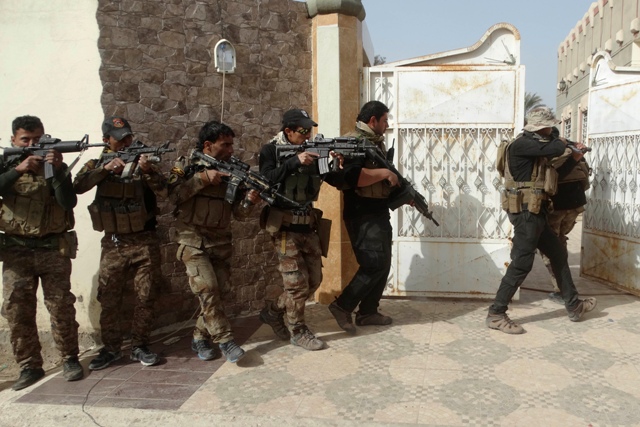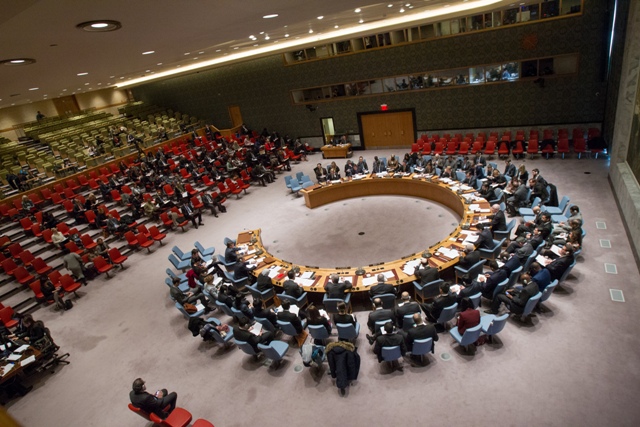Commentary in the One Man's Meat column by Philip Golingai in The Star Online (Feb 13):
No man is a (Jolo) island
 Malaysian soldiers firing at Sulu gunmen at Tanduo village in Lahad Datu.
THREE events that played out on three consecutive days last
week in Kota Kinabalu and 558km across the Sulu Sea on Jolo island might have
treacherous consequences for Malaysia’s
future.
Malaysian soldiers firing at Sulu gunmen at Tanduo village in Lahad Datu.
THREE events that played out on three consecutive days last
week in Kota Kinabalu and 558km across the Sulu Sea on Jolo island might have
treacherous consequences for Malaysia’s
future.
On Feb 5, the Kota Kinabalu High Court ordered a son of the
late Esmail Kiram, a self-styled Sulu Sultan, and 15 Filipinos to enter their
defence for various offences related to the 2013 intrusion of Lahad Datu.
The next day, Phugdalun Kiram II was installed in Jolo
island as the 35th “sultan” of Sulu and North Borneo.
And on Sunday in Jolo island, the Moro National Liberation
Front, in a leadership assembly, declared a son of its founder Nur Misuari as
the No. 2 man in the armed organisation.
Days before the High Court made its ruling on whether 27
Filipinos and three Malaysians charged with waging war against the Yang
di-Pertuan Agong will have to enter their defence, some Sabahans were in a
state of near panic.
Armoured Personnel Carriers and helicopters were seen at and
above the Filipino Market in Kota Kinabalu, sparking rumours that the security
forces were on the alert for another Sulu invasion. (The market along the
city’s waterfront was built in the 1970s for the refugees fleeing southern Philippines during the MNLF war against Manila in the 1970s.)
Apart from the usual WhatsApp rumours, there was a voice
message by a “concerned” woman to her family members about a potential reprisal
by people linked to the Sulu intruders.
Here’s a sample of a WhatsApp rumour: “Folks ... I heard
some disturbing news. The Tanduo intruders will be produced at the High Court
tomorrow and they will be sentenced to death.
“Their relatives n supporters have threatened to create ‘ISIS’ havoc ... any truth? Safer to avoid KK town
tomorrow?”
My reply to that viral message was: “1) Trial is in Kepayan
prison (near Kota Kinabalu). 2) Decision tomorrow is whether to call them to
enter their defence. No sentencing. Factually wrong. But people are frightening
their loved ones by sharing that fake message.”
But some Sabahans were still not convinced. They were still
frightened of their bogeyman (the pendatang or illegal immigrants
living or coming to Sabah who were the musuh
dalam selimut or sleeping with the enemy).
The Tanduo intrusion and cross border kidnappings on the
east coast of Sabah justified their worst
nightmare – that their Sulu neighbours posed a security threat.
Intelligence officers told me that the rumour of a
retaliation was intensified with chatter that Alinapiah @ Datu Piah, the
brother of Sultan Phugdalun, was in Sabah to
seek revenge for his nephew Datu Amirbahar Hushin Kiram.
Amirbahar is facing the death penalty for waging war against
the King during the Tanduo intrusion to claim Sabah
by force.
In February 2013, Phugdalun’s brother (the late) Raja Muda
Agbimuddin Kiram led some 200 gunmen of the Royal Sulu Army in the occupation
of Kg Tanduo in Lahad Datu.
Some 60 people, including nine Malaysian security personnel,
were killed in the operations against the gunmen, some of whom were MNLF
soldiers.
After 240 days of trial, the High Court ordered Amirbahar to
enter his defence for several offences.
Amirbahar is the son of the self-styled Sultan Esmail Kiram
who died in September last year.
The day after the trial, Phugdalun Kiram was installed as
Sultan of Sulu and North Borneo to replace
Sultan Esmail Kiram. (North Borneo was the name of Sabah before it formed
Malaysia in 1963.)
On that Saturday, photographs emerging from Jolo island
showed that Alinapiah had attended the spiritual installation of his brother.
Intelligence assessment reveals that Phugdalun is more
“peace-loving” than his brother.
Sultan Phugdalun, who is among the many claiming to be the
legitimate Sultan of Sulu, is seeking a peaceful resolution to his family’s
claim over Sabah.
If there were any armed attempts, it would come from
Alinapiah.
Some intelligence officers do not want to make the same
mistake they made assessing the capability of this particular Kiram lineage to
wage war against Sabah.
Some thought they did not have the resources to do so until
they landed on the shore
of Tanduo.
The following day, MNLF founding chairman Misuari met 2,000
of his followers on Jolo island.
His 30-something son Uto Karim Misuari was declared vice
chairman of the MNLF central committee, making him the number two man.
Intelligence officers are keeping tabs on Uto Karim, trying to determine his
position on Sabah.
After Putrajaya handed Misuari to Manila
after he fled to Sabah in 2001 following a failed rebellion in southern Philippines, Misuari has had his eye on Sabah.
In the minds of intelligence officers is: will Misuari, who Malaysia supported in the MNLF war against Manila in the 1970s, take
revenge on Putrajaya for “betraying” him in 2001?
To get an idea, I contacted Catholic priest Eliseo Mercado
who attended the MNLF leadership assembly.
The Institute for Autonomy and Governance director is a
personal friend of Misuari.
“Is Misuari still relevant? Is the MNLF still relevant?” I
asked the peace advocate via email.
“No peace deal in (southern Philippines) is ever possible and
sustainable without Nur Misuari and the MNLF,” he said.
“The MNLF is ever alive and a strong force on the ground
notwithstanding the split among some leaders and forces like Mus Sema (Muslimin
G. Sema who chairs his own MNLF group). But no doubt Nur Misuari’s MNLF is the
strongest, largest and formidable force on the ground.”
The MNLF under Misuari, according to Mercado, will continue
– as always – to discuss North Borneo since the MNLF is a stakeholder in the
Sultanate of Sulu and North Borneo.
“North Borneo is an integral part of the Sultanate of Sulu
and North Borneo. Nur and the MNLF are
stakeholders and ‘heirs’ to the Sultanate,” he said.
“Is Misuari still angry with Malaysia
for turning him over to Manila
in 2001?” I asked.
“That perfidy is remembered and NOT forgotten ...,” he said.
Sabah and Jolo are interlinked. Sometimes a ripple in the
notorious island can be felt in Sabah. At times it is bloody.
http://www.thestar.com.my/opinion/columnists/one-mans-meat/2016/02/13/no-man-is-a-jolo-island-what-happens-on-the-philippines-southwestern-island-may-have-an-effect-on-ma/





